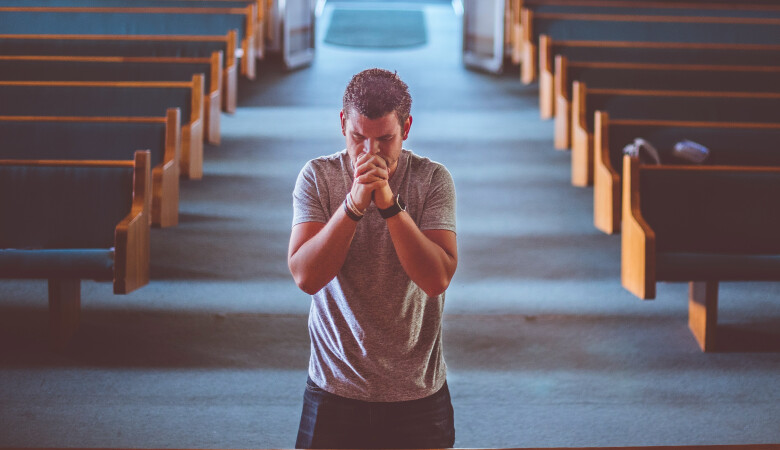The True Gospel Produces True Unity if Truly Followed (Galatians Sermon 4 of 26)
November 17, 2013 | Andy Davis
Galatians 2:11-21
The Gospel, Racism, The Purity and Unity of the Church
Pastor Andy Davis preaches a verse-by-verse expository sermon on Galatians 2:11-21 and the call for unity from Paul based on the truth of scripture.
- SErmon transcript -
Revelation Chapter 7... I'm preaching in Galatians 2 this morning, but in Revelation 7, verse 9 and following, the Apostle John, in exile on the island of Patmos, has an awesome vision of the end of all of Christ's labors, of the end of the Gospel ministry of the great commission. There he has a vision of an astounding unity around the throne. "After this, I looked," [He said], "And there before me, was a multitude greater than anyone could count, from every tribe, and language, and people, and nation, standing before the throne. And they were dressed in white robes, signifying their perfect standing, and righteousness in Christ. And they were holding palm branches in their hands, and they were crying aloud to God, "Salvation belongs to our God, who sits on the throne, and to the lamb."
What an awesome picture of unity there is, and also diversity, at the same time. People from every tribe, and language, and people, and nation, and the completion of the end of the Gospel. Jesus came into this sin fractured world. I've used the analogy before, that sin had an explosive effect on the human race, like that of a fragmentation grenade, and an explosive effect in the physical universe. Jesus uses language, "Whoever does not gather with me scatters." He uses this 'gathering' image a lot, "There are other sheep from other nations that must be gathered." And in First Corinthians 15, Jesus is bringing everything together, and making it one under the head, which is God.
We live in a fragmented world. Sin has fractured people, one from another. You see that in the Garden of Eden, how as soon as sin entered the world, Adam and Eve, the first couple, were fractured from one another and they were divided from one another. Within a chapter, a brother is trying to kill another brother, and on it's gone, ever since then. But today, as the sun makes it's 24-hour global circuit around the world, there are pockets of unity, supernaturally wrought unity, that just defy explanation. Only the Gospel can explain what's going on. There are people gathering to worship the resurrected Christ on this, the Lord's day, that their assemblies fly in the face of all logic, of all history.
These gatherings, unified by the Spirit around the Gospel, are flying in the face of, perhaps even centuries of racial strife, and disunity, and hatred, and warfare. There are simple gatherings of Christians, who, each individual have been transformed by the Gospel of Jesus Christ. They're made new men and new women, and they love each other, and they're worshipping together by the power of the Holy Spirit. In the Balkans and Bosnia, there are small evangelical house churches, where Serbs and Croats, who would have been at each other's throats previously, are now assembling to worship, and loving one another. I've met some of those folks.
In the Czech Republic and Romania, other former Eastern Bloc nations, there are people who used to serve the communist dictatorships, who have been transformed by the Gospel, and are now worshipping with people they used to persecute and torture. In Rwanda, we have Hutus and Tutsis that are assembling together. There was a genocidal war between them, but the Gospel sees some of them, and made them brothers and sisters in Christ. In Palestine, you have former Lebanese Muslims and former unbelieving Jews, who have all come together under Christ, believing in the same Gospel, and are showing a supernatural unity in Christ.
And in America, former racists, both black and white, are able to assemble together, and worship in harmony around the Gospel of Jesus. Isn't that awesome? And Jesus says, "We are all heading toward a kind of unity that just boggles the imagination. It is a unity patterned after the Trinity itself, that we will be as one with another, as the Father and the Son are one." And he prays in John 17, Verse 26, "Father, may they be progressively brought to unity, to let the world know that you sent me and have loved them, even as you love me." So what does that mean? If a local church puts on display a supernatural unity, a unity that only the Gospel can explain, it's good for evangelism and missions, that evangelism and missions in that community thrives, when that kind of thing happens.
A number of years ago, Martin Luther King Jr said, "I have a dream." Well, I have my own dream for First Baptist Church. I would love to see a supernatural unity happening in this church. I'd like to see more and more people walking to church here. Amen? I'm not asking you to walk from Cary, and from Chapel Hill, and all that. Although, who knows? It might do some of you good. But you'd have to start at 3:00 in the morning, I guess. That's not what I'm talking about. I'm just talking about people right from this community, who don't need to drive here, and who have been reached by Matthew and others, that are reaching out with our urban ministry, and have come to faith in Christ, and make this their church. I'd love to see that. Is this a good time for the plug for the conference night? Any time's a good plug, right, Matthew? Anytime. Next Saturday, City Outreach Conference. In the morning, up 'til noon. I think it ends at noon. Or beyond, but just come. Maybe one o'clock. But come and learn how to reach out to people of a different culture, different racial background than you, because I just think that kind of unity is a fragrant aroma to God. And it's so good for the Gospel.
Now, what does all that have to do with Galatians 2:11-21? Well, it has much in every way. The only thing that can produce that unity, that supernatural unity, is the Gospel of Jesus Christ. The centerpiece of that Gospel is justification by faith alone, apart from works of the law. That gospel, which produces supernatural unity, is under direct assault by the devil in every generation. And it's only as the church protects that Gospel doctrine, will that supernatural unity happen. Satan hates this open display of unity, and he hates the doctrine of the cross, and so he fights it.
I. The Threat to Gospel Unity: Peter’s Hypocrisy and Inconsistency (Verses 11-14)
And so, in Paul's day, there was a war going on, spiritual, doctrinal war over the Gospel itself. The Apostle Paul was a traveling church-planting apostle to the Gentiles. He moved through Gentile areas, preaching the Gospel, and seeing amazing fruit among the Gentiles. And he moved through Asia Minor, Turkey, modern day Turkey, and preached the gospel in Galatia, and many Galatian Gentiles came to faith in Christ, genuinely converted, were drawn together as believers in Jesus. But sometime after Paul and Barnabas left, some false teachers came in, what Paul calls 'false brothers,' and they began to assault the doctrine of the gospel, and say that, "Christ crucified is not alone." "That's not all you need. You've got to add the Law of Moses. You've got to add obedience to the law or you cannot be saved." And so Paul was writing this epistle to the Galatians to defend the pure doctrine.
Now, last week, we saw that the assault came from false brothers. Remember, I said in Galatians chapter 1, "It's a false Gospel. They're preaching a Gospel that is no Gospel at all." Well, false gospels produce false brothers and so these are not Christians. They presented themselves as such, but they weren't. They didn't understand the gospel. And so, in Galatians 2:4, he calls them false brothers. So that's an assault from false brothers. Now, in this section today, we have an attack from a genuine brother in Christ. And he didn't even know that he was attacking it. He just had been, in some ways, taken captive by the devil, to do the devil's will, and that is the Apostle Peter. And that can happen. And so, here is Paul, again, the Lord raising up Paul to confront Peter, and sadly, Barnabas, and deal with them at the gospel level. That's what's going on. Let's try to understand the situation. The place was Antioch. Look at Verse 11, "When Peter came to Antioch, I, [Paul] opposed him to his face, because he was clearly in the wrong." Literally, he stood condemned.
Antioch was, in my opinion, the second most important center of Christianity in the early days. After Jerusalem, the gospel moved out. Now, Antioch was north of Jerusalem, and I think, modern-day Turquey and the Gospel came there. The description of how the Gospel got it’s start is in Acts 11. In verse 20 and 21, it says, "Men from Cyprus and Cyrene went to Antioch, and began to speak to Greeks, also telling them the good news about the Lord Jesus. And the Lord's hand was with them, and a great number of people believed, and turned to the Lord." Amen, these are Gentile converts. This is after Cornelius had come to faith in Christ. We'll get into all that in a minute.
But now, these folks are going, and they're just doing nothing, but openly preaching to Gentiles, and the Lord's bringing in a harvest. Well, the church in Jerusalem heard about this, the leaders, and they sent Barnabas down there to see what was going on, and what a perfect choice Barnabas was. That's a nickname, it means 'son of encouragement'. His actual name was Joseph. He was Levite, a Jew, but a tremendously, sweetly encouraging man, and a perfect choice to be sent down there. And it says, "When he saw evidence of the grace of God, he was glad. And he thanked God for the work, and he taught them, and encouraged them, and built them up in their faith." And sometime later, he recruited Saul, he recruited the Apostle Paul from Tarsus, and brought him to Antioch. And the two of them, along with some others, were teaching the church there in Antioch.
Antioch became a strong center of the Gospel and a launching pad for missions. And so, in Acts 13, the church in Antioch sent out Paul and Barnabas on the very missionary journey that led to the Galatian churches being established. It was from that church in Antioch. Now, Peter came down from Jerusalem to Antioch, and he also was encouraged, and loved the work of God there, and the Lord had brought him through some things, and he joined in the fellowship there, and taught them, I'm sure, and encouraged them, and joined with them in their love feasts. Those were the fellowship meals, food that they would have ordinarily eaten at home, they would bring to the church to eat together. I don't think they called it potluck back then, but who knows? They brought it in, and they would share these meals together, and they would just enjoy eating together. And then, at the end of that, I think it would culminate in observance of the Lord's Supper. And it was a tremendous display of unity and love, and they would do that together, and Peter joined right in. And he would eat with Gentiles and Jews alike, believers in Christ. And this is amazing, because the Jewish laws, the laws of Moses, and their customs, would have forbidden this, before the coming of Christ.
The laws of Moses did establish the Jews as a separate people. There are certain ceremonial laws that set them apart from the Gentiles, and somewhat put a wall around them, so that they could maintain their national identity as Jews, such as circumcision, and the dietary regulations. Circumcision is a ritual done on all the boy babies when they are eight days old, and then that's the mark of the covenant with Abraham. And then you had the dietary regulations, foods that they were not allowed to eat. You remember the story of Daniel and how he refused to eat that Gentile food, because it wasn't approved by Leviticus 11, the dietary regulations. But secondly, there are also Jewish man-made restrictions. They were not in the word, but it went beyond these things, so that it got to the point where Jews almost couldn't do anything with Gentiles. They couldn't go in their houses, they couldn't interact with them, and that goes beyond what the Lord intended with the circumcision and dietary regulations, but they were happening. And it got to the point, where they couldn't even walk in a Gentile home, never mind sit down at fellowship.
Those things had so completely separated the Jews, apart from the Gentile world. I think you add to it, the bitterness that many Jews felt, that being under Gentile domination: the Babylonians, the Persians, the Greeks, the Romans, one Gentile dominator after another. And they really hated, in many ways, the Gentiles. They didn't want anything to do with them. And so they had lots of rules that just separated them from any interaction whatsoever with the Gentile world. You remember when Jesus was there at the well, and the Samaritan woman comes, and Jesus just strikes up a conversation with her, and says, "Give me a drink." And she is shocked, "How is it that, you, a Jewish man, can have a conversation, ask me, a Gentile, a Samaritan woman, for a drink?" And then John put in parentheses, "For Jews to have no dealings with Samaritans." They don't do anything together. Well, that's extended, really, out to the whole Gentile world.
Well, Jesus, Jesus changed all of this. He changed it all. In Mark chapter Seven, Jesus taught them, He said, "Listen to me and understand." This is Mark 7:14-15, "Nothing outside of a man can make him unclean by going into him, rather it's what comes out of a man that makes him unclean." And then going further, in a few verses, Mark 7:18-19, he says, "Don't you see, that nothing that enters a man from the outside can ever make him unclean? For it doesn't go into his heart, but into his stomach, and then it passes out of his body." Again, parentheses. In saying this, Jesus declared all foods clean. Do you realize the significance of that? In his life, Jesus declared all foods clean. That's the end of kosher regulations.
By his death on the cross, Jesus fulfilled all types and shadows of the Old Covenant that pointed to the coming of Christ. He fulfilled them all, especially the animal sacrificial system, as we learned, as we study the Book of Hebrews, and he especially crushed all of those man-made regulations, that weren't even in the word of God. All of that was fulfilled and abolished in Jesus. Paul would then eventually teach, openly and clearly, in Ephesians chapter 2, that Jesus, concerning the hostility between Jew and Gentile, Jesus, he himself is our peace, who has made the two one, and has destroyed the barrier, the dividing wall of hostility, that wall of hostility, by abolishing in His flesh the law, with it's commandments, and regulations. His purpose was to create, in himself, one new man out of the two, thus making peace. And in this one body, to reconcile both of them to God through the cross, by which he put to their death their hostility. So there's no more barrier between Jew and Gentile, that's done. It's been fulfilled. It's gone forever. This led to the idea of one new man, not Jew, not Gentile, but Christian. Christian, believer in Jesus. And so it's amazing how it says in Acts 11:26, "The disciples were called Christians first there in Antioch." That's the one new man, the one new person, Christian, not Jew anymore, not Gentile, but Christian.
"By his death on the cross, Jesus fulfilled all types and shadows of the Old Covenant that pointed to the coming of Christ. ... He especially crushed all of those man-made regulations, that weren't even in the word of God."
Now, the Church of Antioch was living out this beautiful truth. It was so wonderful. They would have their services together, and then they would have their love feast, and Jews and Gentiles eating together, and mingling together, and just having supernatural fellowship together. But not all believing, so-called 'believing' Jews accepted this. There were Pharisees, who came to faith in Christ, and who went to Antioch to try to shut it down, to end this freedom, and to bring believers, Jews and Gentiles alike, back under the yoke of Moses. So they came down from Jerusalem, claiming to be from James, and they started teaching this false doctrine. Acts 15, "Some men came down from Judea to Antioch and were teaching the brothers, 'Unless you are circumcised according to the custom taught by Moses, you cannot be saved. Without circumcision, you're going to hell.' " Now, here comes the real tragedy. Peter was drawn in by this. Peter, in some way, at some level, he was intimidated, it says in our text, "He was afraid of them." He had become, in some ways, a people pleaser here, and he broke off table fellowship with Gentiles, stopped eating with them.
Look at Verses 11-13, "When Peter came to Antioch, I opposed him to his face, because he was clearly, he stood condemned. Before certain men came from James, he used to eat with the Gentiles. But when they arrived, he began to draw back and to separate himself from the Gentiles, because he was afraid of those who belong to the circumcision group. The other Jews joined him in his hypocrisy, so that by their hypocrisy, even Barnabas was led astray." Just picture this. One Lord's day, service is over, time has come for the love feast, time has come for them to have some fellowship together. The men from James had, perhaps, privately confronted Peter. He's been intimated. Legalists can be very intimidating people. They can cite chapter and verse, and Peter was not strong enough, or wise enough to stand up to them. He was afraid of them. And at that love feast, he walks into the room, and maybe some Gentiles, "Hey, Peter, would you sit with us?" And he's like, "No, I can't." He begs off.
And then more and more, and then little by little, I don't know if it happened in one week, but over a period of patterns, because the Greek implies that this went on over a period of time. He began to draw himself away. After a while, you've got... You can almost picture, in a room, a red line in the center, and you got all the Gentiles on one side, and all the Jews on the other. This is devastating for the Gospel. This is a great tragedy. And even Barnabas is on the wrong side of the line there, this son of encouragement, the one who came first, and saw all the good things that God was doing there, he drew back. Now, Paul calls it hypocrisy. It was hypocrisy for Peter and it was hypocrisy for Barnabas. They knew the truth. Look at verses 15 and 16, "We, who are Jews by birth," this is what Paul says to Peter, "We, who are Jews by birth, and not Gentile sinners, we know", [we can underscore that word], "We know that a man is not justified by observing the law, but by faith in Jesus Christ." So they're acting contrary to what they believe, that makes them hypocrites. It's hypocrisy.
Now, Peter should have known better. Amen? He should have. Think of his experiences. He was there when Jesus declared all foods clean. He was there when Christ appeared in His resurrection body and sent them to the ends of the Earth to preach the Gospel. He was there when the Holy Spirit was poured out on them and they began speaking in tongues on the day of Pentecost. He was certainly there when the same thing happened to a house full of Gentiles at Cornelius' house, when Peter had been specially prepared by the sovereign hand of God for that mission. He was the apostle to the Jews, but he was chosen by God to be the one to go and bring Cornelius, and his family, the Gentiles, first Gentile converts, into the church. And God had to get him ready for it, you remember? He's there in Joppa, and he's hungry, so he orders a sandwich, or something. I don't know what he ordered for lunch, probably not a sandwich. But anyway, he's waiting for lunch to come. And while he's waiting up on the roof, he's praying, and he has a vision. And he sees Heaven open, and a sheet being let down by it's four corners. And in that sheet, there are all kinds of animals, many unclean animals, and reptiles, and things that Jews were forbidden to eat. And with the sheet, came a voice from heaven, "Arise, Peter, kill and eat." Peter says for the fourth time, "Never Lord." He's good at saying, "No, Lord. Never Lord." He does it four times. Ask me or listen to another sermon, you'll know all four times. But this is the fourth time he said it, "No way, I'm not doing it. I have never eaten anything impure or unclean." Now, here comes the key statement, "Do not call anything impure, that God has made clean. God has the power to take dirty things and make them clean." Let me speak more directly. God has the power to take dirty people and make them clean. And that's the real issue. It's not food, ultimately, that we're talking about here. We're talking about people. We're talking about the power of justification, the power of the cleansing work of Jesus Christ. He has the power to take dirty people and make them clean.
Well, it happens three times. Does that tell you something about Peter? A bit hard headed, perhaps? The underscoring of this, three times he's puzzling about the vision. The men from Cornelius show up, he goes with them. The Spirit says, "Go." He arrives there. Cornelius falls on the ground, as though to worship him. He says, "Get up. I'm only a man." He comes in, he actually enters the house directly under the influence of the Spirit, he goes there. There's an assemblage of Gentiles. They're all there waiting to hear the Gospel. And he says, "I now realize how true it is, that God does not show favoritism, but accepts people from every nation, who fear Him, and do what is right." And as he began to preach the Gospel, the Holy Spirit fell on them, in the exact same way that the Spirit had fallen on the Jews in the upper room. Uncircumcised Gentiles had received the gift of the Holy Spirit, just as they were. And Peter understood the implication, "I should not call any person impure or unclean, who has come to faith in Christ." He got it. He understood it. He had to defend it again, in the next chapter, against these same people, these Jews who are very angry, "You went into the house of uncircumcised men and you ate with them." He defends what he did. He told the whole story, and they relented, and said, "Well, then, God has granted, even to the Gentiles, repentance unto life." So they understood all that.
Then it was Peter, in Acts 15, in the Jerusalem Council, who stood up, and carried the day with his recounting of that whole experience, and this is what he said. Peter, said, "Brothers, you know that some time ago, God made a choice, and we knew that the Gentiles might hear from my lips the message of the Gospel, and believe. God, who knows the heart, showed that He accepted them, the Gentiles, as He had accepted us, by giving the Holy Spirit to them, just as He had did to us. He made no distinction, [listen to this], He made no distinction between them and us," [listen], "For He had purified their hearts by faith." Can I just stop and say, is that true of you? Has God purified your heart by faith in Jesus? The Gospel has the power to do that through justification. The Gospel has the power to transform you from the inside out through faith in Jesus. But this is what Peter says, "Now, then," again, Jews on council, "Why do you try to test God, by putting on the necks of the disciples," the Gentile disciples, "A yoke that neither we, nor our fathers have ever been able to bear? No, we believe it is through the grace of our Lord Jesus that we are saved, just as they are." Did Peter get it? Yes. But after that, he fell into sin. Verse 13, "The other Jews joined him in his hypocrisy, so that by their hypocrisy, even Barnabas was led astray." The beautiful unity of the Gospel is being destroyed by this.
"Has God purified your heart by faith in Jesus? ... The Gospel has the power to transform you from the inside out through faith in Jesus."
II. Paul’s Remedy: Rebuking Peter for Hypocrisy and Inconsistency (Verses 14-18)
The Gentile believers in Antioch must have felt like dirty second-class citizens. They didn't want to touch Peter. The whole thing, it was just so wrong. Paul's remedy is, once again, standing in the breach and standing up for truth. This must have been painful for him to do, but God raised him up to do it. Look at verses 14-18, rebuking Peter for hypocrisy and inconsistency. Paul has incredible clarity here, just as in the first half of the chapter, we have this phrase, "The truth of the Gospel," that's a key phrase. He defended that Titus didn't have to be circumcised, so that the truth of the Gospel might remain with the Gentiles. And so he says, "I saw that they were not acting in line with the truth of the Gospel." God raises Paul up to defend the truth of the Gospel. And so what does he do? He publicly confronts Peter, verse 14, "When I saw that they were not acting in line with the truth of the Gospel, I said to Peter. In front of them all, ‘You are a Jew, and yet you live like a Gentile, and not like a Jew. How then is it that you force Gentiles to follow Jewish customs?’"
Now, why this public rebuke? Why didn't he take him aside privately and talk to him? It's because of Peter's role in the church. Elders, leaders in the church, when they sin publicly, must be corrected publicly, because of the damage that's been done. There's no way that Peter, having been brought to private repentance, to a private consultation with Paul, could have then gone, individually, and undone all the damage that was done. It had to be done publicly. And so he's corrected publicly, and they're not walking in line with the truth of the Gospel. Clear implication of this, is the Gospel doctrine must be lived out, you must walk it out. It's got to be seen in our unity, in the way we live our lives. Now, just a brief thing, where does the quotation end here? Clearly, verse 14, Paul is talking to Peter. And it begins with a quotation mark, which is a modern invention, a contrivance, so we know where there are quotations. They didn't always have them. They didn't always do this. You know, quotation marks. We don't know, actually, when the quotation ends. When does he stop talking to Peter in the church in Antioch? Some say it's right at the end of this statement, "How is it then, that you force Gentiles to follow Jewish customs?" But I actually would argue that it goes right to the end of the chapter, and that he basically preaches the Gospel of justification to Peter in front of all of those guys. And I just think it's more powerful that way. And so that's the way I'm going to treat this. We're going to move the fictitious, non-existing quotation mark to the end of the chapter.
He said this whole packet to Peter in front of them all. We have the true Gospel described here, justification by faith alone. The first issue he deals with in verse 14, is Peter's present behavior was inconsistent with his past behavior, "Something's wrong here. You have messed up at some level. Let's try to figure out what it is, because you are acting inconsistently. You're a Jew, and you live like a Gentile, and not like a Jew. How is it then, that you're now advocating Gentiles become Jews? It doesn't make any sense." Now, Peter had changed his behavior. I don't know that he'd gone so far, as to develop a taste for pork, there's no indication of that. But he knew that the dietary regulations were done and the circumcision regulation was done, he was living like a Gentile. At the love feasts, in terms of interaction with Gentile believers, that was done. He knew, he understood, he had been trained, he had moved on. Over against that, then, we had that pattern that Peter was showing, and then, now, we have this visit from James, and now, suddenly, Peter's behaving differently. Inconsistency, let's try to figure it out.
III. The True Gospel: Justification by Faith Alone (Verses 15-16)
Issue number two then, is the impossibility of justification by works of the law. Look at verse 15 and 16. "We, who are Jews by birth, and not Gentile sinners, [Verse 16] We know that a person is not justified by observing the law, but by faith in Jesus Christ. [Law cannot justify. Only faith in Christ can justify.] We, too, have put our Faith in Christ Jesus, that we may be justified by faith in Christ, and not by observing a law, because by observing the law, no one will be justified."
Alright, so what is this? Well, this is nothing less than the doctrinal center of this whole epistle. This is the center of everything. It's the issue of justification. Now, you may be a visitor here, you may not be a believer, you may not usually go to church, or you may have gone your whole life. Let's talk about justification. What is it? Justification is the legal declaration by the Judge of all the Earth, Almighty God, that you are not guilty of all your sins. You are forgiven, because God has credited to you the righteousness, the perfect righteousness of Christ. There's a double crediting or imputation. Your sin goes to Jesus, He dies the penalty you deserved under the law of God. And Christ's perfect righteousness, that he earned under the law, is given to you as a gift. And on that basis, God says, "You are righteous in my sight." Aww, isn't that sweet? I can't say it enough, if you are a Christian, you're forgiven. You are righteous in God's sight. You are seen to be perfectly obedient through the imputed righteousness of Christ and nothing will ever change that. You can have your good days, and bad days, and sanctification, but nothing will ever change your justification righteousness.
"Justification is the legal declaration by the Judge of all the Earth, Almighty God, that you are not guilty of all your sins. You are forgiven, because God has credited to you the righteousness, the perfect righteousness of Christ."
You didn't earn it by the law, it was given to you by a gift. As a matter of fact, he says in verse 21, "If righteousness could have been gained by the law, then Christ died for nothing." I'm not going to set aside the grace of God. The law of Moses did not set up a ladder that you could climb up to Heaven, if you could just be righteous enough. All the law ever did was tell you, "This is God's perfect standard, and if you don't live it, I'll kill you." That's what the law does. "Here's standard. Here's penalty." But there's no power. There's no power, no transforming power. And so, if you could have somehow earned your justification by law, Jesus would never have become incarnate by the Virgin Mary. He would never have died on the cross. Let me say it plainly, you could use this in evangelism. God didn't send His Son into the world to die on the cross, to provide one of many ways to get to Heaven. God did not send His Son into the world to die on the cross, to provide just one of many ways to Heaven. He did it, because there was no other way. And the law was no way at all, it's a yoke that no one can carry. That's justification. Now, Peter knew this. We've seen that. He understood it, but he was drawing back from table fellowship.
IV. The Effects of the True Gospel: Wall of Separation Destroyed Forever (Verses 17-18)
"We have been justified by faith in Christ. We, who are Jews by birth, and not Gentile sinners, we've been justified by faith, not by law. These Gentiles have been justified by faith, not by law, why are we doing this? Why are we going back to the law?" That's what he's saying. He also says that there are effects of the true Gospel, look at verses 17 and 18, "If while we seek to be justified in Christ, it becomes evident that we ourselves are sinners, does that mean that Christ promotes sin? Absolutely not. If I rebuild what I destroyed, I prove that I am a law breaker." What Paul is saying here, is that, when you have been justified by faith, you start to live a different kind of life. You start to live it out. The vertical justification leads to horizontal unity with other people who've been justified, whether they're Jews or Gentiles. You're going to start living out of unity together. You're going to love each other. Jesus changes all of that. He's the one that transformed everything. Now, I said, back in Mark, chapter 7, Jesus just, if we can put it this way, just up and declared all foods clean. Who are you to do that? You know who He is? He is Lord of Heaven and Earth.
Did He have the right to say all of that is done now, did He? Yes. He had the right to do it. Jesus, He calls himself Lord of the Sabbath. The Son of man is Lord of the Sabbath. He can tell us what we're to do with the Sabbath. He can also tell us what to do with food. And He can say, "Yes, you have read in Leviticus 11 and in Deuteronomy, the law of dietary regulations. I'm telling you, it's all finished. You can go ahead and eat the raven, if you'd like to. You're free now to eat shellfish, if you guys really like that kind of thing."
"You're free now, if you'd like to eat pork, you are allowed to eat pork with no smiting of the conscience." Did he have the right to do it? Did Jesus promote sin? He did not promote sin. And yes, He had the right to do it. When Jesus tells you something, that settles it. Did Christ promote sin? No. No, Christ established a New Covenant free from ceremonial regulations. The time for identifying the Jews as a separate people is over. Once the Messiah came, it's done. No more circumcision, no more dietary regulations, just one person now, believer or not, whether you're from Jew or Gentile, it doesn't matter. Believe in Jesus, that's it. And so Christ did not promote sin.
Now, Paul says, "If we, then, rebuild what we destroyed…” why would we do that? We broke through that barrier, that dividing wall. We raised the thing, and plowed, and got rid of it. We're doing love feast together. Why are you back putting bricks and mortar back up between us? Why would you do that? Don't you prove, that if you're doing that, you're a law breaker of one kind or another? Either you're a law breaker then, or you're a law breaker now. What do you think Paul would say? "Peter, you're a law breaker now. You're breaking Christ's law of love. Let's get rid of this wall. God doesn't want it here. He doesn't want it here." Now, in verses 19 through 21, you wonder, "How in the world am I going to cover this today?" I'm not. I'm not. And I already planned not to. I'm going to preach, next time I preach in Galatians, a whole sermon on Galatians 2:20. I think that one verse is worthy of a whole sermon. You heard Sam quoted it in his testimony today, sweet. That's beautiful. It's a great, great verse. But let me just touch on it lightly, to show you how it fits into context, because so often, that verse is just grabbed out of context. We're not quite sure how it fits in. What Paul does here, in his conversation with Peter, is he puts everything on himself. He said, "I want to talk about what I've experienced." Verse 19, "For through the law, I died to the law, so that I might live for God." What does he mean by that? "The law killed me in my self-righteousness, and brought me dead to the foot of the cross, and Christ raised me from the dead spiritually. The law killed me, Christ raised me, and now, I'm done with the law, in it's power to condemn me, and kill me. But through the law, I died to the law. I'm free now from the law's condemnation, not from it's moral precepts, righteousness, 'Love God with all your heart, love your neighbors, yourself.' That's not it. But I'm free from the law and it's ability to send me to hell. I'm free from that. Praise God."
Verse 20, "I have been crucified with Christ.” "Spiritual union. When Jesus died, I died, and I no longer live. I'm living a whole new kind of life. The life I now live in the body, I'm living by faith in the Son of God, who loved me and gave Himself for me." Now, we're going to look at each of these statements more next time, but what he's saying is, "My individual salvation teaches me others have been individually saved, the same way we are one together in Christ. Let's have table fellowship together." So Peter, eat that ham sandwich. Walk across the red line there at Antioch, and sit down at table with some Gentile Christians, and say, "I'm sorry. Will you please forgive me? I messed up, but I love you and we're all one in Christ."
V. Applications
What application can we take from this? Well, I've already given you the central application. How tragic would it be for any of you to leave this room today unregenerate or unconverted? How tragic would that be for you? Hear, now, the simple Gospel. You already heard it, but I'll say it again. The law has the power to condemn you. The law commands you to love God with all your heart, soul, mind, and strength, every moment of your life. You haven't done it and you can't do it. And because you haven't done it, you're guilty, and condemned under the law. It has the power to send you to hell, but Christ came to take your guilt and your punishment on Himself. And if you trust in Him, His death on the cross has become yours. You united with Him, were crucified with Christ and you die. Your old nature person in Adam dies. And you are raised to new life in Christ. Trust in Him. Trust in Him.
Secondly, see the importance of Christian unity. Is it important that FBC put this doctrine on display here in our fellowship? Yes. This is incredibly important. Let's be as diverse as the providence of God will let us be. I am not speaking of theological diversity. There is one Lord, there is one faith, there is one baptism, there is one God and Father of all. But I'm talking about people who embrace that one Lord, and that one faith, and that one baptism, and that one God, who is Father of all. Those, I want fellowship with as many different folks like that as can be. They're incredibly encouraging. I'm talking about internationals. I'm talking about Hispanics. I'm talking about African-Americans. I'm talking about Caucasian Americans. I'm talking about as much diversity as the Lord would bring. We should pray toward it, and minister toward it, and delight in it, and just pray that the surrounding world will see it, and know that God sent Jesus.
Thirdly, let's know that that kind of unity can only be maintained with great effort, great effort. We have to make every effort to keep the unity of the spirit through the bond of peace. Satan's going to try to divide us. He's going to try to get us be upset at each other and angry at each other. And we have to make every effort, and sometimes, that's going to take some strong dealing, like Paul dealing with Peter. Sometimes that happens and done in love.
And fourth, leaders are vital to the health of the church. But that doesn't mean they're perfect, does it? Okay? Peter was a great man. God used him in a mighty way. Barnabas was a great man. God used him in a mighty way. They both needed correction. And you know what? Even though there's not clear indication of it, Paul needed correction too.
Let's finish with that interaction between Paul and Barnabas. In my opinion, at one point, Paul was right and Barnabas was wrong. It's right here. And another time, Barnabas was right, and Paul was wrong. And that's what the whole case of John Mark. Should Paul have given John Mark another chance? I think in the end, I think Barnabas was vindicated, that John Mark was useful to Paul in his ministry, as he says in 2 Timothy 4. Sometimes, iron's going to sharpen iron one way, and sometimes, the other iron sharpens the first iron, and we help each other to grow. Then leaders need to be humble and say, "Help me, correct me, show me where I can grow." And that's what plurality of elders does. We do that. That's what the church does. Leaders are essential to the health of the church, but that doesn't make them perfect.
Let's close in prayer. Lord, we thank you for the Gospel. Thank you for the chance we have here in Galatians to celebrate justification by faith alone every week, and I thank you for the lessons here of the confrontation that Paul did with Peter, and how you brought health from that difficult moment. I praise you for that. Now, help us to walk in the truth that we have learned. I want to just say thank you for what you did in Sam's life and their family are grateful for that. I thank you for the work you're doing at NC State, and I just pray your blessing, and with Kyle, I just pray for more and more baptisms in this church. We pray in Jesus' name. Amen.



























